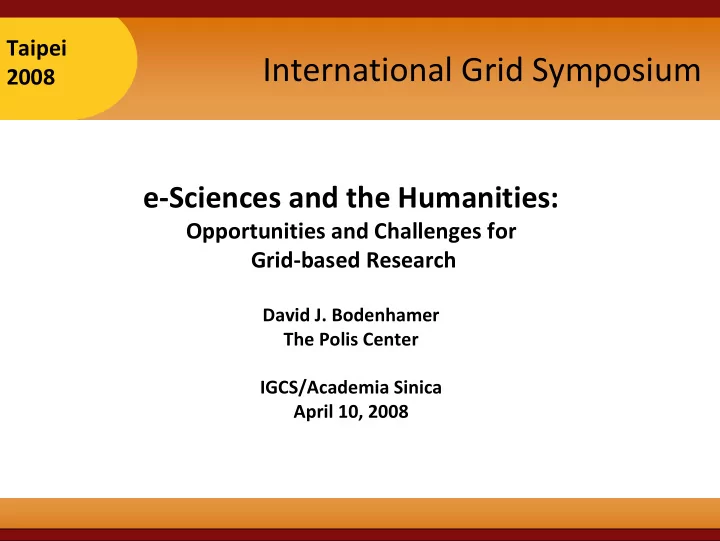

Taipei Taipei International Grid Symposium 2007 2008 e ‐ Sciences and the Humanities: Opportunities and Challenges for Grid ‐ based Research David J. Bodenhamer The Polis Center IGCS/Academia Sinica April 10, 2008
Taipei Taipei Digital humanities 2007 2008 • Digital humanities rapidly achieving distinct status but still amorphous in scope and direction: “…study of what happens at the intersection of computing tools with cultural artefacts of all kinds….” Centre for Computing in the Humanities, Kings College, University of London
Taipei Taipei Digital humanities as product 2007 2008 • Significant e ‐ Resources • Text archives • Data archives • Image archives • Web ‐ based production and access
Taipei Taipei e ‐ Science (UK) 2007 2008 • “e ‐ Science is essentially a mode of working that is reliant on a distributed number of computing resources…which can be made to work together for the purposes of one research outcome.” http://www.methodsnetwork.ac.uk/escein ce/e ‐ science.html
Taipei Taipei Cyberinfrastructure (US) 2007 2008 • “… information, expertise, standards, policies,tools, and services that are shared broadly across communities of inquiry but developed for specific scholarly purposes: [it] is…more specific than the network itself, but…more general than a tool or a resource…for a particular project…or…a particular discipline.” Our Cultural Commonwealth (ACLS Commission on Cyberinfrastructure, 2006)
Taipei Taipei e ‐ Science 1.0 2007 2008 • Digital libraries • Initial goals focused on data • Creation • Access • Preservation • Exchange
Taipei Taipei Successes 2007 2008 • Rapid increase in digital materials (Project MUSE, JSTOR, databases, etc) • On ‐ line access • Convenient search tools • Digital archives and repositories (AHDS, D ‐ space, etc.) • Highly visible projects (Valley of the Shadow, Vision of Britain, etc.)
Taipei Taipei e ‐ Science 1.5 2007 2008 • e ‐ Science came to mean grid Data grid Access grid Computational grid • Little demand for computational grid in the humanities
Taipei Taipei e ‐ Science 2.0 2007 2008 • Now, e ‐ Science means grid ‐ based collaboration • Technical collaboration (e.g., networks, exchange protocols, middleware, etc.) • Procedural collaboration (e.g., standards for access and use) • Scholarly collaboration • ICT ‐ discipline or domain collaboration
Taipei Taipei e ‐ Science for the humanities 2007 2008 • Application of intensive computing technologies and methods to research questions relating to the development of human society. • Designed to manage and analyze the data deluge brought on by the new digital age in ways that are suitable for the humanities. • Computer ‐ based collaborations
Taipei Taipei Humanists and e-science 2007 2008 • Most humanists still in e ‐ Science 1.0 (digital libraries) • Some humanists are moving into e ‐ Science 1.5 • Few humanists are in e ‐ Science 2.0 • Why?
Taipei Taipei Understanding the humanities 2007 2008 • Approaches (themes) • Questions • Data • Methods • Tools • Culture
Taipei Taipei Approaches or themes 2007 2008 • What themes engage modern humanists? • Interdisciplinary or multi ‐ perspective • Interdependency • Intercultural and trans ‐ cultural • Multi ‐ scalar and inter ‐ scalar • Visualizing complexity
Taipei Taipei Questions 2007 2008 • Modern humanists are interested in • Context � Non ‐ linear � Fuzziness • Culture � Variation � Diffusion � Transmission
Taipei Taipei Data 2007 2008 • Most humanities data still non ‐ digital • Wide range of data types • Archival records � Letters, diaries, newspapers, photographs,etc. � Government papers, censuses, maps, etc • Generated or collected data � Surveys, field samples • Multimedia • Artefacts
Taipei Taipei Methods 2007 2008 • What methods do they employ? • Discipline ‐ based � Archival (document based) � Fieldwork (ethnography, oral history) � Hermeneutics (textual analysis and interpretation) � Statistical • Fusion
Taipei Taipei Tools 2007 2008 • Most humanists do not use computer ‐ based analytical tools • Most software used by humanists was not developed with humanities scholarship in mind • A GIS example: the North American Religion Atlas (www.religionatlas.org)
Taipei Taipei Culture 2007 2008 Most humanists still: Work in isolation Use traditional methods Lack computing skills Are not interdisciplinary
Taipei Taipei Generational shift 2007 2008 • Modern humanities more open to diverse approaches • Strong shift toward interdisciplinary research • Quantitative data and methods more common • More collaborative
Taipei Taipei e ‐ Science and humanities today 2007 2008 • Digitization • Use of e ‐ Tools • Information management • Data integration • Textual analysis • Statistical analysis • Visualization
Taipei Taipei Challenges 2007 2008 • Framing suitable e ‐ problems • Evidence • Incomplete and missing data • Ambiguous data • Conflicting typologies/semantic standards • Language barriers • Legal access • Metadata
Taipei Taipei Other challenges 2007 2008 • Disciplinary knowledge base • Theory/models/methods • Best practices • Technology • Expensive • Steep learning curve • Too little interaction with ICT experts
Taipei Taipei More challenges 2007 2008 • Spatio ‐ temporal integration • Epistemology • Nonlinear • Non ‐ expert knowledge • Choice and customization
Taipei Taipei Humanities grids 2007 2008 • Access Grid • Resource Grids • Data Grid • Text Grid (e.g., TextGrid, Germany) • Image Grid (e.g., USC Digital Archive) • Spatial Grid (e.g., HGIS ‐ Europe)
Taipei Taipei New collaborations 2007 2008 • DARIAH (Digital Research Infrastructure for the Arts and Humanities, UK) • Virtual Knowledge Studio (Netherlands) • CATCH (Continuous Access to Cultural Heritage, Netherlands)
Taipei Taipei New vision 2007 2008 • New collaboratories that allow • Retrieval • Contextualization • Hypothesis building • Flexible narration • Integration into knowledge networks • Virtual Research Environments (VRE) • GRID+Web 2.0
Taipei Taipei Opportunities for humanities grid 2007 2008 • Life paths • Networks • Virtual reality • Gaming • Simulations • Deep mapping
Taipei Taipei The biggest need 2007 2008 • The human humanities grid • Opportunities for interchange and experiment • Creation of knowledge base • Development of problem statements • Working out of research design • Building viable partnerships and a sustainable community
Recommend
More recommend